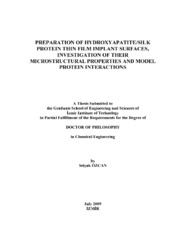Please use this identifier to cite or link to this item:
https://hdl.handle.net/11147/3004Full metadata record
| DC Field | Value | Language |
|---|---|---|
| dc.contributor.advisor | Çiftçioğlu, Muhsin | - |
| dc.contributor.author | Özcan, Selçuk | - |
| dc.date.accessioned | 2014-07-22T13:48:44Z | - |
| dc.date.available | 2014-07-22T13:48:44Z | - |
| dc.date.issued | 2009 | - |
| dc.identifier.uri | http://hdl.handle.net/11147/3004 | - |
| dc.description | Thesis (Doctoral)--Izmir Institute of Technology, Chemical Engineering, Izmir, 2009 | en_US |
| dc.description | Includes bibliographical references (leaves: 258-267) | en_US |
| dc.description | Text in English; Abstract: Turkish and English | en_US |
| dc.description | xx, 267 leaves | en_US |
| dc.description.abstract | Biocompatible hydroxyapatite (HAp) coatings of load bearing metallic in vivo hard tissue implants act as local scaffolds for enhanced osteoconduction, providing fast bone apposition and cementless fixation. In this study, in an attempt to exploit the potential of hydroxyapatite as a carrier of bone morphogenetic proteins for post operative accelerated healing, and implant durability, the tailored microstructural properties, and protein adsorption capabilities of thin film hydroxyapatite implant surfaces were investigated.A novel particulate sol method was used to fabricate HAp thin films on bioinert glass, and Ti6Al4V substrates by dip and spin coating. The microstructural characterization of the thin films was carried out by SEM/EDX, AFM, XRD, and FTIR, and their surface roughness, Vickers hardness and adhesion strength were determined. The effects of silk fibroin and sericin thin film layers on the HAp film microstructure, and model protein (bovine serum albumin, BSA) adsorption behavior (by the size exclusion HPLC method) were investigated. The minimum threshold solid content of the suspensions was determined as 15% by weight for a continuous HAp film structure. The silk sericin and fibroin intermediate layers drastically improved homogeneity of the HAp layer. The BSA adsorption of the glass/sericin/commercial-HAp film was 2.6 ug/cm2, more than twice of the glass/commercial-HAp, and glass/sericin/dry-milled-HAp films, evidencing the effectiveness of surface micro/nano topographical structure as well as chemical structure. The XRD patterns of spin coated commercial-HAp films on Ti6Al4V pointed out to a particular crystal orientation which increased the positive degree of cooperativity between HAp and proteins during adsorption or deposition. | en_US |
| dc.language.iso | en | en_US |
| dc.publisher | Izmir Institute of Technology | en_US |
| dc.rights | info:eu-repo/semantics/openAccess | en_US |
| dc.subject.lcc | RD132. O994 2009 | en |
| dc.subject.lcsh | Implants,Artifical--Biocompatibility | en |
| dc.subject.lcsh | Hydroxyapatite coating--Biocompatibility | en |
| dc.subject.lcsh | Protein-protein interactions | en |
| dc.subject.lcsh | Thin films | en |
| dc.title | Preparation of Hydroxyapatite/Silk Protein Thin Film Implant Surfaces, Investigation of Their Microstructural Properties and Model Protein Interactions | en_US |
| dc.type | Doctoral Thesis | en_US |
| dc.department | Thesis (Doctoral)--İzmir Institute of Technology, Chemical Engineering | en_US |
| dc.relation.publicationcategory | Tez | en_US |
| dc.identifier.wosquality | N/A | - |
| dc.identifier.scopusquality | N/A | - |
| item.openairecristype | http://purl.org/coar/resource_type/c_18cf | - |
| item.languageiso639-1 | en | - |
| item.openairetype | Doctoral Thesis | - |
| item.grantfulltext | open | - |
| item.fulltext | With Fulltext | - |
| item.cerifentitytype | Publications | - |
| Appears in Collections: | Phd Degree / Doktora | |
Files in This Item:
| File | Description | Size | Format | |
|---|---|---|---|---|
| T000210.pdf | DoctoralThesis | 39.72 MB | Adobe PDF |  View/Open |
CORE Recommender
Page view(s)
220
checked on Mar 31, 2025
Download(s)
142
checked on Mar 31, 2025
Google ScholarTM
Check
Items in GCRIS Repository are protected by copyright, with all rights reserved, unless otherwise indicated.